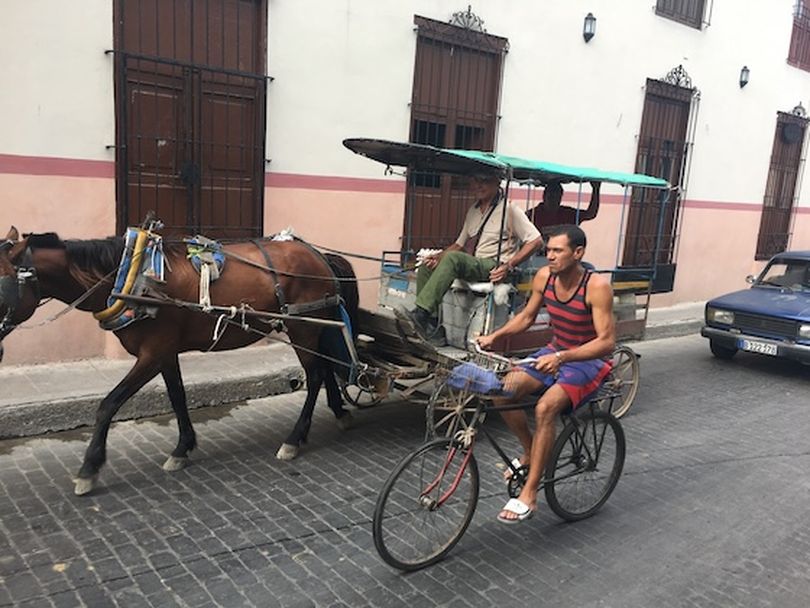Cuba: Education is a key to its complications

Politics was one of the things that the late film instructor Manny Farber tended to emphasize in the classes he taught at UC-San Diego.
In his view, one that had been informed by his career as an artist and film critic, everything – and I do mean everything – was political. I remember one of his lectures in which a student got up and started to walk out.
Farber had been railing on about the meaning of art and how film especially was a director’s way of making socially conscious statements. “Where are you going?” he yelled at the student.
The kid looked around, startled, before managing to stutter, “I’m just going to meet my girlfriend.”
“That’s a political act!” Farber yelled. “Everything is a political act!”
The rest of us in the class laughed, which – same as Farber’s outburst – was typical of the 1970s. There was no room for tender sensibilities in that decade. Not on a university campus, anyway.
I mention political acts for a simple reason: In my last blog post I wrote about the 2018 Road Scholar tour that my wife and I took to Cuba. And ever since the revolution led by Fidel Castro managed to overthrow the government of Fulgencio Batista, sentiments in the U.S. regarding Cuba have been fairly polarized.
Officially, the U.S. government has maintained an embargo of Cuba since 1962. And except for 12 exceptions, ranging from family visits to humanitarian projects, a directive straight from the U.S. embassy in Cuba states this: “Travel to Cuba for tourist activities remains prohibited by statute.”
One of those exceptions involves “educational activities,” which is a Road Scholar specialty. And which is what my wife and I, along with our 20 fellow travelers, took advantage of. Life in the Cuba of today was something we all wanted to be educated about.
In a previous post, I wrote that our group – after gathering in Miami – flew to the Cuban city of Santa Clara. We spent the night in the Hotel Los Caneyes, which was set up to resemble a traditional Indian village. Each bungalow was called a Baiguana, and ours turned out to be surprisingly average: two twin beds, a TV, air-conditioning, a bath with shower – and only a slight musty smell.
The next day we took a bus to the port city of Cienfuegos, which translates as “100 fires.” In fact, though, the city was named after the man – Don Jose Cienfuegos – who, we were told, was the man who in 1817 told a group of French settlers from Bordeaux and Louisiana that they could stay there. A UNESCO World Heritage Site, the city was known as “the pearl of the south” in colonial times.
Our hotel was La Unión, which according to its website these days boasts “a restaurant, two bars, a swimming pool, a meeting room and a panoramic elevator, as well as spacious and comfortable rooms with colonial-style decor.” But our meal that first night was a sign of things to come: Those of us who had come to Cuba expecting a gourmet experience were going to be sadly disappointed.
As Jose Luis later explained, “If the beef is hard to chew, it’s 100 percent Cuban.”
As we would come to see, the lack of tasty cuisine wasn’t because Cubans don’t know how to cook. Quite the contrary. It was because times were hard all over Cuba – and presumably still are. We were told that the standard Cuban salary at the time was 33 CUC (Cuban Convertible Peso), which amounts to about $33 U.S. today.
So how did Cuban families make a go of it? With money sent from family and friends living abroad. From whatever private hustle people can manage (including the ubiquitous black market). And from tourism, including groups such as Road Scholar, with some four million tourists visiting every year.
I for one was only too happy to provide help, especially when what I received in return was good coffee. Halfway to the town of Trinidad for a day excursion, we stopped and I was able to purchase a café cordito, which turned out to be the best café macchiato that I’ve been served outside of Italy.
In Trinidad, also a UNESCO World Heritage Site, we enjoyed some free time, allowing us to hit museums, tour an art gallery and for me to climb to the top of the city’s clock tower. It was there that I met the first of an interesting pair of couples, a young Russian man and woman, who asked me to take their photos.
The other pair was an American couple from Ohio who weren’t part of any tour group but, ignoring the travel exemptions, were simply traveling on their own and staying at bed-and-breakfasts for what they told me was 17 CUC a night. They were a bit worried about problems they might face when returning home to face U.S. customs. But they weren’t about to let the future interfere with how much enjoyment they were having at the moment.
Which made me think of two things. One involved Jose Luis saying for the umpteenth time, “It’s complicated.” And the second was the Spanish phrase that seemed to go along with what my two American acquaintances were feeling: “Hasta ahora, todo bien.” Or roughly translated, “Up to now, everything’s fine.”
That second one in particular is a mantra worth adopting – even if it, too, is something that Prof. Farber would no doubt consider a political statement.
